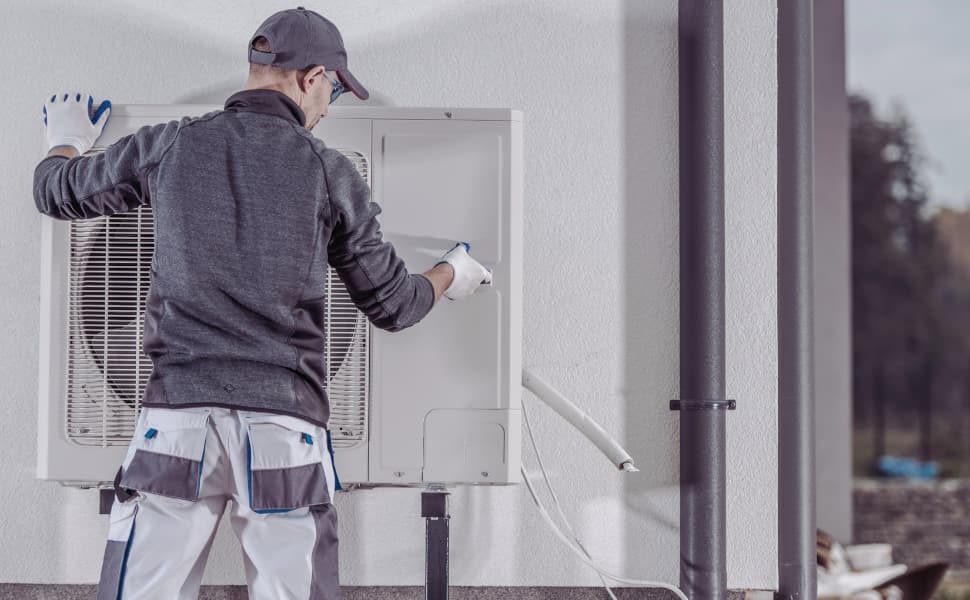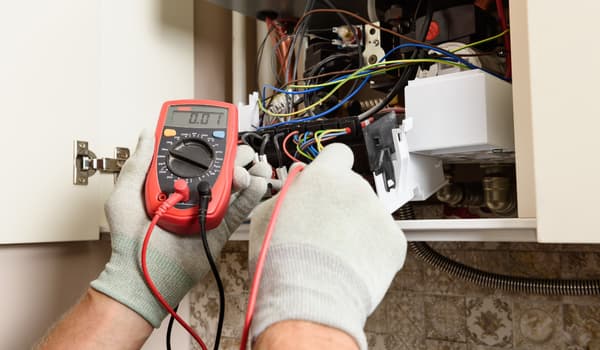Heat IQ is committed to helping homeowners across Yorkshire embrace efficient and sustainable heating solutions. Heat pumps are a key part of this transition, offering a low-carbon alternative to traditional gas or oil heating systems. We detail everything you need to know about heat pump efficiency, focusing on air source heat pumps (ASHPs) and ground source heat pumps (GSHPs). By understanding how these systems work and their benefits, you can make an informed choice for your home.
Heat Pumps
Heat pumps use a simple yet ingenious process to extract heat from the environment and transfer it indoors. Air source heat pumps draw heat from the air, while ground source heat pumps rely on stable temperatures underground. Both types use electricity to power a compressor that amplifies the collected heat for home use.
Unlike traditional heating systems, heat pumps do not generate heat—they move it. This makes them incredibly efficient, as they can produce significantly more heat energy than the electricity they consume. Crucially, they perform well even in the UK’s mild and variable climate, making them a viable year-round heating solution.
Efficiency: COP and SCOP
The efficiency of heat pumps is often measured using two key metrics: Coefficient of Performance (COP) and Seasonal Coefficient of Performance (SCOP).
- COP refers to the ratio of heat output to energy input at a specific moment. For example, a COP of 3 means the heat pump generates three units of heat for every one unit of electricity used.
- SCOP provides a broader picture, measuring the system’s average performance across an entire heating season.
In the UK, heat pumps generally achieve COPs between 2.5 and 5.0, depending on the type, installation quality, and operating conditions.
Air Source Heat Pumps (ASHPs) Efficiency
- How They Work
ASHPs extract heat from the outdoor air, even when temperatures are as low as -15°C. They are particularly popular in the UK due to their relatively low installation cost and adaptability to urban and suburban homes.
- Efficiency
ASHP efficiency can range from a COP of 2.5 to 4.0, depending on outdoor temperatures and system design factors. While they perform less efficiently during cold weather, modern ASHPs are designed to maintain functionality in most UK conditions.
- Advantages
ASHPs are easier and cheaper to install than GSHPs, requiring no ground excavation. They are ideal for homes with limited outdoor space and can be integrated into existing heating systems.
- Challenges
Their efficiency can drop in colder weather, particularly in poorly insulated homes. In extreme cases, a backup heating source may be required.
Ground Source Heat Pumps (GSHPs) Efficiency
- How They Work
GSHPs extract heat from the ground through a network of pipes buried in horizontal trenches or vertical boreholes. These systems deliver consistent performance because ground temperatures remain relatively stable year-round (around 10°C in the UK).
- Efficiency
GSHPs typically achieve COPs of 3.0 to 5.0, offering higher efficiency than ASHPs. This makes them particularly suitable for larger properties or rural homes with ample outdoor space.
- Advantages
GSHPs’ reliance on stable ground temperatures allows them to provide reliable heating even in the coldest months. Over time, their higher efficiency can lead to more significant energy savings.
- Challenges
The main drawback of GSHPs is their higher installation cost due to the need for trenching or borehole drilling. They also require significant outdoor space, making them less practical for urban homes.
Factors That Influence Heat Pump Efficiency
Several factors determine how well a heat pump performs:
- Insulation: A well-insulated home prevents heat loss, allowing the pump to work more efficiently.
- Heating System Design: Heat pumps perform best with low-temperature systems like underfloor heating or oversized radiators.
- Climate: The UK’s mild climate supports heat pump operation, but colder regions may see a slight reduction in ASHP efficiency.
- Installation Quality: Professional installation ensures the system meets its efficiency potential.
- Maintenance: Regular servicing helps prevent issues and maintains optimal performance.
Comparing Costs and Savings
ASHPs are generally less expensive to install, ranging from £7,000 to £13,000. GSHPs, however, can cost between £15,000 and £30,000 due to the need for excavation. Despite higher upfront costs, both systems offer long-term savings on energy bills, thanks to their efficiency.
The UK government offers incentives like the Boiler Upgrade Scheme (BUS), which provides grants of up to £5,000 for ASHPs and £6,000 for GSHPs, reducing the financial barrier for many homeowners.
Environmental Benefits
Heat pumps significantly reduce carbon emissions compared to traditional heating systems, mainly when powered by renewable electricity. By switching to a heat pump, homeowners contribute to the UK’s target of reaching net zero emissions by 2050. Pairing a heat pump with solar panels can enhance its environmental and financial benefits.
Heat IQ for Your Heat Pump Needs
Heat IQ specialises in designing and installing heat pump systems tailored to your home’s unique requirements. Our team prioritises quality installation, customer education, and ongoing support to ensure you get the most out of your heat pump.
Contact Heat IQ today to learn how a heat pump could transform your home’s heating system and reduce your carbon footprint.
Heat pumps are a practical and eco-friendly heating solution for UK homeowners. You can make a well-informed decision by understanding the efficiency of air source and ground source systems. Explore Heat IQ’s resources or book a consultation to start your journey towards sustainable heating today.
Related Articles
- Air Source Heat Pumps (ASHP) Introduction & Overview
- Heat Pump Maintenance for Winter
- Suitability Criteria for Installing a Heat Pump in Your Home
- Insulation and Air Source Heat Pumps
- Cost Savings with Air Source Heat Pumps (ASHP) Over Time




